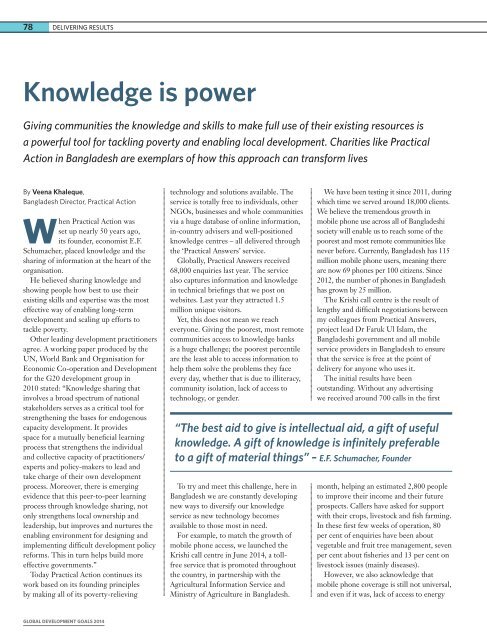FAMBB
FAMBB
FAMBB
You also want an ePaper? Increase the reach of your titles
YUMPU automatically turns print PDFs into web optimized ePapers that Google loves.
78 DELIVERING RESULTSKnowledge is powerGiving communities the knowledge and skills to make full use of their existing resources isa powerful tool for tackling poverty and enabling local development. Charities like PracticalAction in Bangladesh are exemplars of how this approach can transform livesBy Veena Khaleque,Bangladesh Director, Practical ActionWhen Practical Action wasset up nearly 50 years ago,its founder, economist E.F.Schumacher, placed knowledge and thesharing of information at the heart of theorganisation.He believed sharing knowledge andshowing people how best to use theirexisting skills and expertise was the mosteffective way of enabling long-termdevelopment and scaling up efforts totackle poverty.Other leading development practitionersagree. A working paper produced by theUN, World Bank and Organisation forEconomic Co-operation and Developmentfor the G20 development group in2010 stated: “Knowledge sharing thatinvolves a broad spectrum of nationalstakeholders serves as a critical tool forstrengthening the bases for endogenouscapacity development. It providesspace for a mutually beneficial learningprocess that strengthens the individualand collective capacity of practitioners/experts and policy-makers to lead andtake charge of their own developmentprocess. Moreover, there is emergingevidence that this peer-to-peer learningprocess through knowledge sharing, notonly strengthens local ownership andleadership, but improves and nurtures theenabling environment for designing andimplementing difficult development policyreforms. This in turn helps build moreeffective governments.”Today Practical Action continues itswork based on its founding principlesby making all of its poverty-relievingtechnology and solutions available. Theservice is totally free to individuals, otherNGOs, businesses and whole communitiesvia a huge database of online information,in-country advisers and well-positionedknowledge centres – all delivered throughthe ‘Practical Answers’ service.Globally, Practical Answers received68,000 enquiries last year. The servicealso captures information and knowledgein technical briefings that we post onwebsites. Last year they attracted 1.5million unique visitors.Yet, this does not mean we reacheveryone. Giving the poorest, most remotecommunities access to knowledge banksis a huge challenge; the poorest percentileare the least able to access information tohelp them solve the problems they faceevery day, whether that is due to illiteracy,community isolation, lack of access totechnology, or gender.We have been testing it since 2011, duringwhich time we served around 18,000 clients.We believe the tremendous growth inmobile phone use across all of Bangladeshisociety will enable us to reach some of thepoorest and most remote communities likenever before. Currently, Bangladesh has 115million mobile phone users, meaning thereare now 69 phones per 100 citizens. Since2012, the number of phones in Bangladeshhas grown by 25 million.The Krishi call centre is the result oflengthy and difficult negotiations betweenmy colleagues from Practical Answers,project lead Dr Faruk Ul Islam, theBangladeshi government and all mobileservice providers in Bangladesh to ensurethat the service is free at the point ofdelivery for anyone who uses it.The initial results have beenoutstanding. Without any advertisingwe received around 700 calls in the first“The best aid to give is intellectual aid, a gift of usefulknowledge. A gift of knowledge is infinitely preferableto a gift of material things” – E.F. Schumacher, FounderTo try and meet this challenge, here inBangladesh we are constantly developingnew ways to diversify our knowledgeservice as new technology becomesavailable to those most in need.For example, to match the growth ofmobile phone access, we launched theKrishi call centre in June 2014, a tollfreeservice that is promoted throughoutthe country, in partnership with theAgricultural Information Service andMinistry of Agriculture in Bangladesh.month, helping an estimated 2,800 peopleto improve their income and their futureprospects. Callers have asked for supportwith their crops, livestock and fish farming.In these first few weeks of operation, 80per cent of enquiries have been aboutvegetable and fruit tree management, sevenper cent about fisheries and 13 per cent onlivestock issues (mainly diseases).However, we also acknowledge thatmobile phone coverage is still not universal,and even if it was, lack of access to energyGLOBAL DEVELOPMENT GOALS 2014


